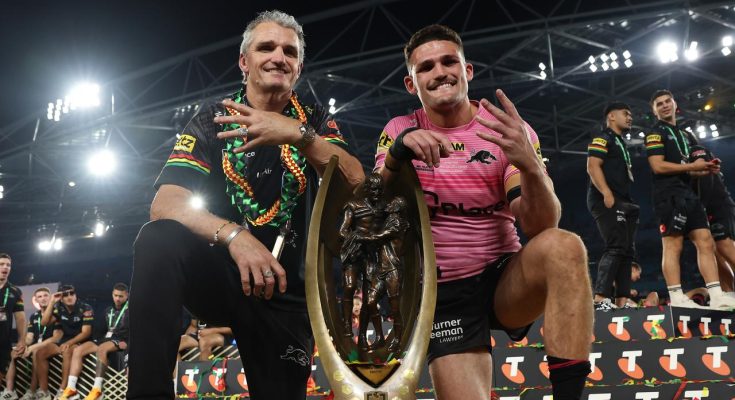The Penrith Panthers have long prided themselves on a legacy built through grit, community pride, and consistent on-field brilliance. Over the past few years, the club has transformed from a team of promise to a certified rugby league powerhouse, collecting premierships and earning widespread admiration across the NRL. However, recent accusations swirling around the club have prompted a reckoning that could ultimately cast a lingering shadow over everything the Panthers have built. The phrase “low-key filth” has begun to surface in public discussions, fan forums, and media circles alike, acting as a damaging descriptor that now threatens to define more than just isolated incidents—it could redefine the narrative around the modern Penrith dynasty.
It’s a loaded accusation, one that doesn’t necessarily point to outright scandals, crimes, or back-page tabloid fodder. Instead, it speaks to a perception—a vibe—that the Panthers are treading a fine line between arrogance and aggression, between confidence and contempt, and between clever gamesmanship and something more sinister. While the phrase itself may have originated in jest or frustration from rival fans, it has since taken on a life of its own, infiltrating the very fabric of how Penrith is being perceived by a broader public. And when perception becomes powerful enough, it can take down even the mightiest of legacies.
For a team as dominant as the Panthers have been, criticism is inevitable. Success breeds jealousy, scrutiny, and higher expectations. But what makes this situation particularly volatile is the internal and external validation of such sentiments. When seasoned commentators begin to echo fan frustrations, and when former players-turned-pundits question the club’s culture, the criticisms stop being fringe noise and start forming a legitimate concern. The growing consensus, whether fair or not, is that Penrith’s success is increasingly coming with an unpleasant edge. Opposing teams now brace for not just a tough match but also the kind of banter, niggle, and psychological warfare that leaves a bad taste long after the final whistle. While some applaud it as competitive edge, others condemn it as dirty play wrapped in charisma.
Much of the controversy centers around behavioral optics rather than criminal wrongdoing or code breaches. Players being overly brash in victory, perceived mocking of opponents, smug post-game celebrations, and the use of subtle gamesmanship during matches—these are the sort of acts that feed the “low-key filth” narrative. It’s not illegal, but it’s not clean either. These moments pile up in the minds of fans and critics until they form a mosaic of disdain that no longer sees Penrith as simply dominant but rather as the NRL’s reigning villains. It’s a reputation that, once cemented, is hard to shake.
Even within the Panthers’ own community, there’s growing discomfort about this shift. Longtime fans, many of whom have supported the club since its less glamorous days, now find themselves torn. On one hand, they revel in the winning culture and the pride of seeing homegrown talent rise to superstardom. On the other, they fear that the club’s identity is being rewritten into something more divisive. The pride of being underdogs who earned respect through perseverance is being replaced by the unease of being labelled as entitled juggernauts who have lost touch with humility.
Club leadership is aware of these murmurs. Head coach Ivan Cleary, widely respected for his calm demeanor and strategic acumen, has tried to navigate the tension by defending his players while also acknowledging that optics matter. His public comments have attempted to walk the line between brushing off criticism and signaling awareness that the team’s image is becoming a problem. The challenge for Cleary is immense: how do you maintain the intensity and swagger that has defined your success without crossing into territory that invites disdain?
Star players, too, have become lightning rods for this scrutiny. Nathan Cleary, arguably the best halfback in the world and a central figure in the Panthers’ recent dominance, finds himself in a delicate position. Revered for his skill and poise, he’s also been linked to moments that critics argue fuel the “filth” narrative—subtle digs in interviews, post-match antics, and on-field mind games. Whether intentional or not, every gesture is now under a microscope. It’s the price of prominence in a league as passionate and polarized as the NRL.
The media’s role in this saga cannot be ignored. The phrase “low-key filth” has been picked up by outlets looking for conflict, and its use has intensified since midseason tensions flared between Penrith and several high-profile rivals. Coverage has not only amplified the term but given it legitimacy, turning what might have been dismissed as fan banter into a recognizable catchphrase symbolizing deeper issues within the club. Once media outlets begin using a phrase as a framing device, it becomes part of the cultural lexicon. That alone can do more damage to a club’s reputation than a single off-field incident ever could.
There’s also a generational divide at play. Younger fans and players often embrace the brashness, seeing it as part of a new-age sporting culture where flair, confidence, and personality are valued just as much as discipline and decorum. Older stakeholders, however, view the same behavior as disrespectful and corrosive to the spirit of the game. This cultural clash adds another layer to the debate and makes it harder for the Panthers to find a unified response that satisfies all demographics.
Yet, not everything in the Panthers camp is spiraling into controversy. Their on-field discipline remains among the best in the league in terms of penalties conceded and error rates. Their development pipeline continues to produce elite talent, and their community engagement initiatives are still held in high regard. This is not a club in chaos—it’s a club at a crossroads. The risk isn’t implosion; the risk is erosion. Reputational erosion. And that’s often harder to detect and harder to repair than anything else.
If Penrith’s leadership hopes to avoid letting this narrative define them, the path forward will require more than just winning games. It will require intentional image management, a reassertion of values, and perhaps even some visible acts of contrition or humility. That could mean reigning in the post-game swagger, making public gestures that reinforce sportsmanship, or directly addressing the criticism head-on through media engagement. Avoiding the issue won’t make it go away—it will only allow it to fester.
The window for course correction remains open. Dynasties in sport are rare and precious. To have one tainted by something as preventable as a perception of arrogance or underhandedness would be a tragic twist for a club that has worked so hard to rise from the ashes. What Penrith does next—how they handle the growing whispers of “low-key filth”—will go a long way in determining how this chapter of their legacy is ultimately written. It’s not just about premierships anymore. It’s about character, perception, and legacy. Those are the things that last long after the scoreboard has faded and the championship rings have dulled.
For now, the Panthers remain kings of the NRL jungle. But even kings must watch their steps, lest their crowns begin to tarnish from the shadows of their own making.



